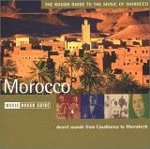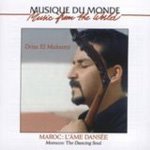 The Rough Guide to the Music of Morocco
The Rough Guide to the Music of MoroccoWorld Music Network
To many American and European ears, the music of Morocco has been distilled to occasional glimpses of gnawa trance music and distant reflections of Arab-Andalusian flamenco. But while only eight miles separate Europe from Africa at Gibraltar, Moroccan music is just as multicultural and diverse as its relatives from the north.
This Rough Guide presents a range of Moroccan music from traditional to modern (though mostly the latter) by eleven artists with very different approaches. It's an eye-opening collection, matched by crisp and insightful liner notes that detail the background of the country and its musical traditions, placing each entry in perspective. The most immediately catchy track comes first in the form of Nass Marrakech's “Zeze Meyel,” a bouncy and enthusiastic song with lively percussion.
Two groups which made it big around the same time, Nass El Ghiwane and Jil Jilala, are represented by very different selections. The Jil Jilala song is pure fun and melismatic lilt, while “Mahmouna” builds from a quiet, direct poetic recital into a more reverent mode. They really just scratch the surface, but interested listeners will find abundant opportunities to enjoy these artists on record.
Not many people are aware of the Jewish musical traditions of North Africa, though Algerian pianist Maurice El Medioni tugged a few ears with Cafe Oran ten years ago. Emil Zrihan, who emigrated to Israel in 1967, keeps the flame of Sephardic music alive with an emotionally charged recital here. And breaking out with modern electronic production, the two Casablancan rappers known as Dar Gnawa join forces with Moroccan-born, London-based producer U-cef to do a musically flat but lyrically dense rap.
 Maroc: L'Ame Dansee (Morocco: The Dancing Soul) - Dris El Maloumi
Maroc: L'Ame Dansee (Morocco: The Dancing Soul) - Dris El Maloumi Buda Musique
Like the guitar, its relatively newborn descendant, the oud is linked with a classical tradition of performance, but the oud's roots are a hell of a lot deeper and more diverse. Moroccan virtuoso Dris El Maloumi approaches the oud with a spirit of discovery on The Dancing Soul, consciously drawing from contemporary and tribal sources, cleverly bringing them into unexpected juxtaposition.
To be clear up front, this is a recital, not a collection of catchy songs. Maloumi conceived of these ten pieces (two to twelve minutes long) as a suite, each reflecting a mood and embodying specific styles, and he takes his time with the music. “The Moon,” one of the few tracks with vocals, is full of reflective pauses and held tones with pronounced resonance. Drawing from Berber musical heritage, the piece coaxes rather than compels.
While the focus of The Dancing Soul is El Maloumi's oud playing, he receives sensitive and responsive support from percussionist Lahouncine Baquir on daf, bendir and darbouka. Baquir takes a brief couple of minutes at center stage on “Notes” touring South Moroccan styles. The title piece, which comes next, starts out as a relatively lively jaunt, then shifts into a more soft and subtle mode, carried along by a percolating five-part rhythm.
The Dancing Soul can be enjoyed on many levels. Its reflective mood and understated subtlety lend it naturally to meditation, but if you listen to the way El Maloumi shapes each note with its own character and momentum, you can find yourself equally transfixed by the way he plays his instrument. On top of that, the rhythms regularly shift from 4/4 to 6/8 to 5/4 and back, shaping the flow and phrasing along the way. And should you have half an hour to spend with the liner notes, then listen again, you'll find this suite a vivid essay in multicultural embrace.
Tags: Morocco, Fes, Maghreb, Music

No comments:
Post a Comment